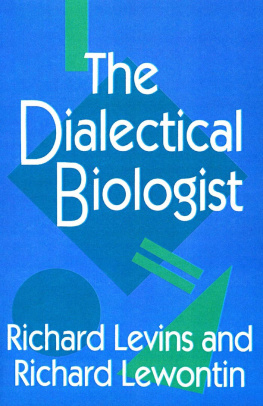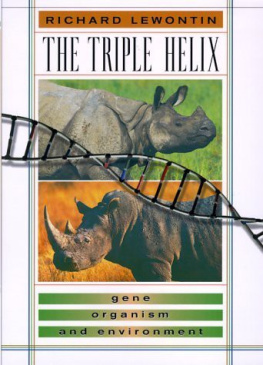Lewontin Richard C.Levins Richard. - Biology Under the Influence
Here you can read online Lewontin Richard C.Levins Richard. - Biology Under the Influence full text of the book (entire story) in english for free. Download pdf and epub, get meaning, cover and reviews about this ebook. year: 2007, publisher: New York University Press, genre: Politics. Description of the work, (preface) as well as reviews are available. Best literature library LitArk.com created for fans of good reading and offers a wide selection of genres:
Romance novel
Science fiction
Adventure
Detective
Science
History
Home and family
Prose
Art
Politics
Computer
Non-fiction
Religion
Business
Children
Humor
Choose a favorite category and find really read worthwhile books. Enjoy immersion in the world of imagination, feel the emotions of the characters or learn something new for yourself, make an fascinating discovery.

- Book:Biology Under the Influence
- Author:
- Publisher:New York University Press
- Genre:
- Year:2007
- Rating:3 / 5
- Favourites:Add to favourites
- Your mark:
- 60
- 1
- 2
- 3
- 4
- 5
Biology Under the Influence: summary, description and annotation
We offer to read an annotation, description, summary or preface (depends on what the author of the book "Biology Under the Influence" wrote himself). If you haven't found the necessary information about the book — write in the comments, we will try to find it.
Biology Under the Influence — read online for free the complete book (whole text) full work
Below is the text of the book, divided by pages. System saving the place of the last page read, allows you to conveniently read the book "Biology Under the Influence" online for free, without having to search again every time where you left off. Put a bookmark, and you can go to the page where you finished reading at any time.
Font size:
Interval:
Bookmark:
Thank you for buying this ebook, published by NYU Press.
Sign up for our e-newsletters to receive information about forthcoming books, special discounts, and more!
Sign Up!
A publisher of original scholarship since its founding in 1916, New York University Press Produces more than 100 new books each year, with a backlist of 3,000 titles in print. Working across the humanities and social sciences, NYU Press has award-winning lists in sociology, law, cultural and American studies, religion, American history, anthropology, politics, criminology, media and communication, literary studies, and psychology.
Biology Under the Influence
Dialectical Essays on Ecology, Agriculture, and Health
Richard Lewontin and Richard Levins

Monthly Review Press
New York Copyright 2007
All rights reserved
Library of Congress Cataloging-in-Publication Data
Lewontin, Richard C., 1929- Biology under the influence : dialectical essays on ecology, agriculture, and health / Richard Lewontin and Richard Levins. p. cm. ISBN 978-1-58367-157-3 (pbk.) ISBN 978-1-58367-158-0 1. BiologyPhilosophy. 2. BiologySocial aspects. I. Levins, Richard. II. Title. QH331.L5355 2007 570.1dc22 2007033070
Design Terry J. Allen
Monthly Review Press
146 West 29th Street - Suite 6W
New York, NY 10001
http://www.monthlyreview.org
10 9 8 7 6 5 4 3 2 1
Five Cubans are now serving long sentences in U.S. prisons because they were monitoring the activities of Cuban migr terrorist groups in Miami. From their cells they have been active both in helping to make prison life more bearable for the other inmates in their immediate community and continuing to be full participants in the life of the Cuban revolution. We admire their steadfastness and creativity in resistance, and we dedicate this book to Antonio Guerrero, Fernando Gonzlez, Ren Gonzlez, Gerardo Hernndez, and Ramn Labaino, and to people all over the world struggling for their release.
Biology Under the Influence is a collection of our essays built around the general theme of the dual nature of science. On the one hand, science is the generic development of human knowledge over the millennia, but on the other it is the increasingly commodified specific product of a capitalist knowledge industry. The result is a peculiarly uneven development, with increasing sophistication at the level of the laboratory and research project, along with a growing irrationality of the scientific enterprise as a whole. This gives us a pattern of insight and blindness, of knowledge and ignorance, that is not dictated by nature, leaving us helpless in the big problems facing our species. This dual nature gives us a science impelled both by its internal development and the very mixed outcomes of its applications to understand complexity as the central intellectual problem of our time. But it is held back by the philosophical traditions of reductionism, the institutional fragmentation of research, and the political economy of knowledge as commodity.
This means we have to be engaged on two fronts: 1) we stand against the obscurantist anti-science, which ranges from direct manipulation of the EPA and FDA by the government and the hype of the drug companies, to creation-ism and the mystification of mathematical chaos; 2) we also reject scientism, the claim that other peoples ideas are superstition while ours are uniquely objective knowledge verified by numbers. We reject the postmodern view that, still reeling from having discovered the fallibility of science, comes to deny the validity of knowledge or, overwhelmed by the uniqueness of the particular, refuses to see patterns even of uniqueness. Scientism focuses mostly on the last stages of research, hypothesis testing, thus ignoring the questions of the origins of the hypotheses to be tested and of the source of the rules of validation. We challenge both the mystical holism that sees everything as so much all one that it becomes a shifting blur without parts, and the reductionism which claims that the most fundamental truths are found in the smallest parts of things. We trace how this works out in agriculture, health, ecology, and evolution. Then we step back and look at the processes of abstraction and model building, and return to examining the present-day obstacles to an integral, complex, dynamic view of the world.
We come to this project as participant observers. Both of us have been active in overlapping though somewhat different areas of population genetics, ecology, evolution, biogeography, and mathematical modeling. As participants we have been engaged in the nuts and bolts of our sciences in lab and field and before the computer. In our scientific work we have attempted to apply the insights of dialectical materialism that emphasizes wholeness, connectedness, historical contingency, the integration of levels of analysis, and the dynamic nature of things as snapshots of processes. Although we have variously worked with enzymes, fruit flies, corn, ants, gene frequencies, and orange trees, our point of view was always influenced by how we see the world as a whole.
We also step outside of the specific scientific problems to become observers and examine the nature of science and the uses of mathematics and modeling. In this, we step into what usually fits within philosophy of science. Occasionally we have worked jointly. At other times our separate work was strongly or loosely influenced by our ongoing dialog of almost forty-eight years.
We have also been political activists and comrades in Science for the People; Science for Vietnam; the New University Conference; and struggles against biological determinism and scientific racism, against creationism, and in support for the student movement and antiwar movement. On the day that Chicago police murdered Black Panther leader Fred Hampton, we went together to his still bloody bedroom and saw the books on his night table: he was killed because of his thoughtful, inquiring militancy. Our activism is a constant reminder of the need to relate theory to real-world problems as well as the importance of theoretical critique. In political movements we often have to defend the importance of theory as a protection against being overwhelmed by the urgency of need in the momentary and the local, while in academia we still have to argue that for the hungry the right to food is not a philosophical problem.
The essays in this book were written over a 20-year period and were directed at different audiences, some academic colleagues and some activists with little technical knowledge. Not all chapters will be equally relevant to everyone. Redundancy is usually undesirable in books, but here it is justified by two considerations: the removal of repetition would destroy the coherence of some chapters, and since the approach is largely unfamiliar, its repetition in different contexts may not be amiss.
Some of the entries are short essays from our column Eppur Si Muove that ran in the journal Capitalism, Nature, Socialism. These include Are We Programmed? about genetic determinism, The Politics of Averages about statistics, Schmalhausens Law about vulnerability, Life on Other Worlds, Evolutionary Psychology, as well as several others. Longer pieces, some previously published, discuss uncertainty, the political economy of agriculture, Cuba, systems theory, model building, the organism/environment relation, and chaos. And, of course, there is Isador Nabis contribution, Greypeace, through which in a jest we spend our rage.
Next pageFont size:
Interval:
Bookmark:
Similar books «Biology Under the Influence»
Look at similar books to Biology Under the Influence. We have selected literature similar in name and meaning in the hope of providing readers with more options to find new, interesting, not yet read works.
Discussion, reviews of the book Biology Under the Influence and just readers' own opinions. Leave your comments, write what you think about the work, its meaning or the main characters. Specify what exactly you liked and what you didn't like, and why you think so.










